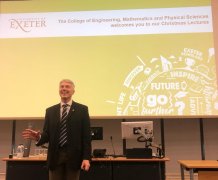Articles

Schoolchildren were given a fascinating insight into some of the most captivating scientific discoveries and breakthroughs, at a special annual event.
Hundreds of budding scientists gather for sixth annual Christmas Schools' Science Lectures Day
Schoolchildren from across the South West region were given a fascinating insight into some of the most captivating scientific discoveries and breakthroughs, at a special annual event.
Schoolchildren from across the South West region were given a fascinating insight into some of the most captivating scientific discoveries and breakthroughs, at a special annual event.
More than 200 children and teachers visited the University of Exeter’s Streatham Campus to participate in the sixth annual Science Lectures Day, hosted by the College of Engineering, Mathematics and Physical Sciences (CEMPS).
The inspirational event saw both young academics and former students from Exeter deliver a range of talks, covering topics ranging from the discovery of planets to virtual reality and cyber protection.
Professor Pete Vukusic, Associate Dean for Education in CEMPS said: “Our four inspirational young lecturers engaged our visitors fantastically through the course of the event.
“For many of these visiting students, this was the first time they have visited a university and experienced the passion and enthusiasm of our excellent staff and, thanks to our inspirational lecturers, we hope that the event successfully inspires the next generation of STEM subject applicants.
“We are always delighted to host this event, and planning is already underway to ensure next year’s event is equally as successful and enjoyable for everyone involved.”
The first session of the event was held by Dr Houry Melkonian, a mathematics lecturer from the University’s Penryn Campus in Cornwall. During the talk, entitled Mathematics and the discovery of planet Neptune, Houry described the work of the famous 19th century Cornish mathematician John Couch Adams which covered the wide range of astronomical applications of mathematics, linked closely with local South West history.
Dr Simon Horsley, from Physics, then gave a fascinating lecture called Black holes and invisibility cloaks: what gravity can teach us about light. The talk featured a host of illuminating demonstrations including laser beams bending through a treacle solution-filled fish-tank and an innovative toy insect demonstration of Fermat's principle.
In the afternoon, Ayesha Tandon from the Met Office, an alumna of Exeter’s successful Natural Sciences programme, gave an engaging Climate Science lecture on Heatwaves and Hurricanes, demonstrating the critical causes and impacts of the planet's changing climate.
The final lecture of the day was given by Alexander Richardson-Hall, a recent appointee to Computer Science, which explored the future of Cybersecurity. His talk, Network monitoring in virtual reality, inspired the audience to think creatively about the processes of imaging and visualisation in the operation of cyber protection.
Date: 19 December 2019
